Ed Protzel's Blog, page 6
May 9, 2016
Infusing History Into Fiction: Manumission, Freeing Slaves
I am thrilled by the number of readers who’ve told me they love love love the minor character of young abolitionist Ellen in my novel, The Lies That Bind. I love Ellen, too, of course, and I suspect you did—or will—as well. On my recent appearance on LA Talk Radio’s The Writers Block, the show’s terrific hosts, Jim Christina and Bobbi Bell, were especially enthusiastic about Ellen, and we had a lot of laughs discussing her (listen to the interview here).
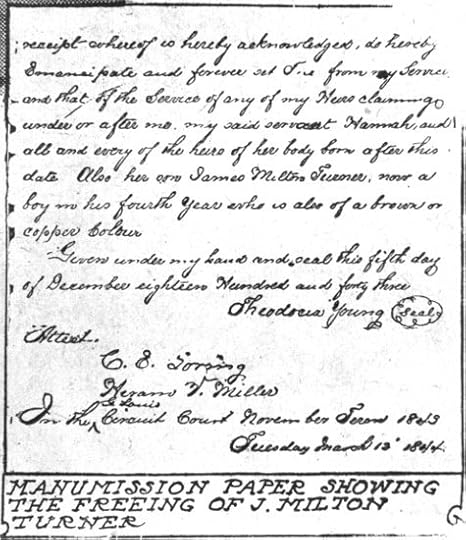
Freeing the Slaves
In the novel, Ellen earns a few dollars by keeping the town of Turkle, Mississippi’s minor records, including deeds, wills, agreements—and manumission documents. Historically, manumission is defined as the act of a master freeing his/her slave(s), which required legal papers (to “manumit” the slave). Most often, a master would manumit a favored slave in his/her will or in a deed, or manumit an older slave whose productivity was in severe decline. However, the chance of a field slave or laborer being freed in this or any other way was almost nil.
In the novel, Ellen has never had the opportunity to fill out a manumission document freeing any slaves, and that bothers her greatly. Ellen and her grandfather, a church Senior Deacon (and religious fundamentalist), constitute the town’s only abolitionists, an unforgivable sin in the antebellum South. The anomalous pair is tolerated, however, because they are such idealists, so religious, and so impoverished and powerless, that people consider them harmless.
Historically, manumissions increased in the late-eighteenth century, after the American Revolution, and the percentage of freedmen went from 1 percent of the black population to 10 percent (7 percent in Virginia, for example). However, after the invention of the cotton gin (1793) opened extensive lands to labor-intensive cotton cultivation, manumissions declined almost to zero. In parallel, there were abolitionist preachers in the South who convinced some planters to free their slaves. However, after the 1840s, these idealistic preachers were driven to flee north or were even killed outright. So the religious establishment became solidly pro-slavery until the Civil War.
Interestingly, in a revised edition of The Slave Community: Plantation Life in the Antebellum South, John W. Blassingame relates his discovery of a brilliant, black pro-slavery theologian called Bentley’s Old George, who served as preacher to a church of wealthy planters. The congregation, which paid the preacher $700 a year, offered to buy the man from the estate that owned him, and Old George refused to be bought by them!
Likewise, in the second novel in my DarkHorse Trilogy, Honor Among Outcasts, the main characters encounter such a pro-slavery black preacher—under circumstances that are both moving and tragic. (I just couldn’t pass up the dramatic irony.)
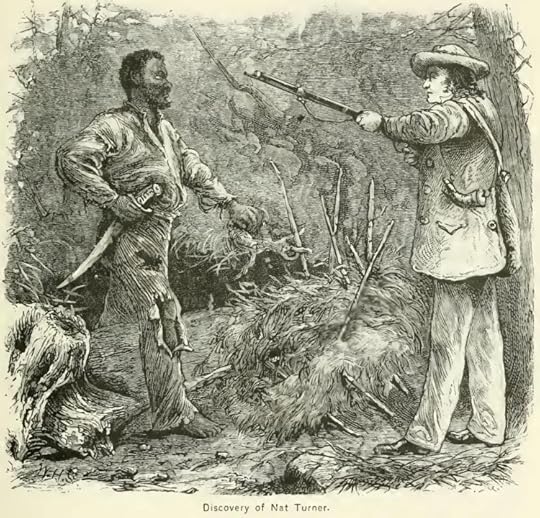
Revolting Against Bondage Halts Manumissions
It seems slaves just weren’t satisfied with their condition! After the Haitian slave revolt of 1791-1804, in which all the French masters were killed, and the rebellion led by American slave Nat Turner, planters in the South lived in fear of their unwilling bondsmen rising up against them. The South’s false portrayal of the “happy slave”—which I wrote The Lies That Bind in part to debunk—was used as propaganda to counter Northern abolitionists’ criticism of the South’s “peculiar institution.” As a result of this fear, the South passed laws that made manumission quite difficult, if not impossible; after which few slaves were freed until the Thirteenth Amendment to the U. S. Constitution ended slavery.
In Lies, Ellen’s life is changed when Durk Hurst asks her to draw up manumission papers to free his (secret) partners, a group of (former) slaves, fulfilling her lifelong dream. Of course, as in the rest of the novel, the irony seldom lets up. Durk does not really own his partners, so his signature does not really manumit them. In fact, under the circumstances, his partners must still pretend to be his slaves, which they never were, and they must keep their fake manumission as secret as their partnership with Durk. A twisted situation, indeed!
Reading Ellen Scenes
I plan to include a few scenes involving Ellen at my upcoming reading at Left Bank Books in St. Louis on Thurs., June 23. It will give fans a sense of the ironic situation Ellen (and Durk) find themselves in, and why she is so endearing to readers. Stop by the reading if you’re in town. See details.
Next blog post: I’ll continue my discussion of Ellen and the literary function she serves in The Lies That Bind.
April 18, 2016
This Writer’s Challenge: Finding Humanity in a Violent Setting
Working on Honor Among Outcasts, Book 2 in my DarkHorse Trilogy (to be published in 2017) has been challenging emotionally and creatively. The atmosphere in Honor is far different from the first book in the trilogy, The Lies That Bind. Whereas the backdrop for Lies was a staid, rigid (read: caste, slave) antebellum South society, and the accompanying tension a product of the characters’ subterfuges, Civil War Missouri, where Book 2 takes place, was quite another matter.

James W. Erwin’s Guerrilla Hunters in Civil War Missouri
Missouri’s western counties during the war were near absolute chaos. The brutal war in Missouri pit neighbor against neighbor, community against community, with both sides robbing, burning homes and crops, and slaughtering husbands and sons indiscriminately — even on their own sides. Guerrillas and Union soldiers even took scalps — that’s how horrific the war was.
(To learn more about it, I recommend James W. Erwin’s Guerrilla Hunters in Civil War Missouri.)
A Far Darker Place
There is a fine line between a drama and a thriller, and I try to keep a balance of both in all my writing. Unlike in Lies, where the tension is atmospheric, the tension in Honor Among Outcasts is very much event- and plot-driven. My job is to see that the story’s characters develop their own motivations, not merely to portray them as victims trying to escape the mayhem of war. I, therefore, have no choice but to incorporate violence into the story’s historical milieu.
At times, I have to take a break because the violence and situations are so unsettling.
Nearly all of the main characters in Lies are reprised in Honor Among Outcasts. You’ll again meet Durk, Big Josh, Antoinette, Isaac, Devereau, and Wounded Wolf. Readers will be pleased to know that even young Ellen, whom readers adore, has a role to play in the coming dramatic events. Given the environment and events depicted in Book 2, the emotional state of many of the characters has devolved to, shall we say, a far darker place. Far darker.
I hope I don’t shake up fans of The Lies That Bind too much!
Upcoming Events
April 28: Reading at Subterranean Books in St. Louis' U. City Loop
June 23: Reading at Left Bank Books in St. Louis’ Central West End
Sept. 25: Garden District Book Shop, New Orleans
Oct. 29: St. Louis Central Library's 2016 Author Shout Out!
Buy/order The Lies That Bind.
April 11, 2016
My Latest Radio Interview
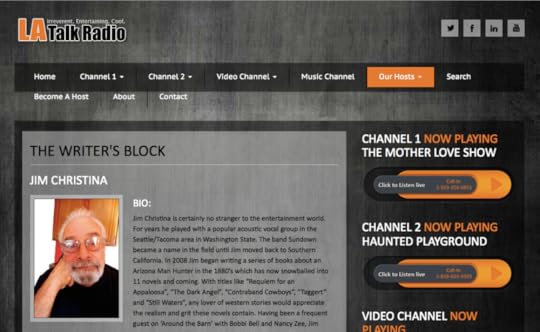
I really enjoyed my interview on LA Talk Radio’s “The Writer’s Block” show on March 31 . The Writer’s Block interviews a wide range of terrific writers every week talking about their work, and I was honored to be a part of it.
Click here to listen to my interview.
Hosts Jim Christina and Bobbi Jean Bell had both read The Lies That Bind (the first book in my DarkHorse Trilogy) and were very perceptive, even down to the novel’s nuances, from subtle to overt. We discussed much during the hour-long program, including many of the novel’s secrets, twists and turns. But, of course, none of us exposed the book’s most startling, and critical, secret. That readers have to discover on their own!
The show focuses primarily on the craft of writing, with incisive questions. I highly recommend the podcasts to both experienced and aspiring writers. I especially enjoyed their January 7 interview with Craig Johnson, creator of the Walt Longmire Mysteries, and the main character in the Longmire TV series. Craig himself is an interesting character—although, he is a real person. The show also interviewed my literary agent, Jeanie Loiacano, on February 24. Fascinating!
In my interview, the three of us had a big laugh discussing one of The Lies That Bind’s minor, but colorful, characters, Ellen—and the Honor Store she runs with her grandfather, a Senior Deacon in the local church. Everyone I talk to seems to love unworldly young Ellen. And so do I. From a practical point of view, the Honor Store seems to make little sense, and anyone who knows anything about business can tell it’s designed (unintentionally) to fail as an enterprise. Fortunately, as Bobbi Jean pointed out, Ellen makes a few dollars on the side handling the town’s records that are considered too “unimportant” to be sent all the way to the county seat. These include manumission document that would free slaves!
Ellen and her grandfather are idealists in the purest sense. Whereas the other characters in the book tell and live lies in order to survive, Ellen and her grandfather are the opposite, clinging to absolute convictions, regardless of the worldly consequences.
Ellen and the Honor Store were inspired additions to the book, which I came up with when composing the scenes. I don’t know where they came from, but they were really fun to write, and apparently everyone is having real fun reading about them. Ellen doesn’t appear often in the novel, but she does serve to bracket key elements of the story. And she’s a nice break from the story’s tension.

Coming Attractions!
April 12: I’ll be doing a seven-minute reading from Honor Among Outcasts (the second book in my DarkHorse Trilogy), during St. Louis Writers Guild's monthly open mic night. Book 2 is scheduled to be published in 2017, and the feedback I’ll get from fellow writers should be worthwhile.
April 18-22: Shakespeare Week on Goodreads! - celebrating The Bard's literary legacy and 400th anniversary. I plan to participate in #ShakespeareWeek.
April 28: I’ll be reading from The Lies That Bind at Subterranean Books in St. Louis' University City Loop. Details.
April 30: Independent Bookstore Day - a good time to visit your local independent bookstore. Find a local bookstore here.
Thurs., June 23: I’ll be reading from The Lies That Bind at Left Bank Books in St. Louis’ Central West End. Details.
March 22, 2016
Daniel Woodrell’s Novel, "Woe to Live on" Rings True Historically
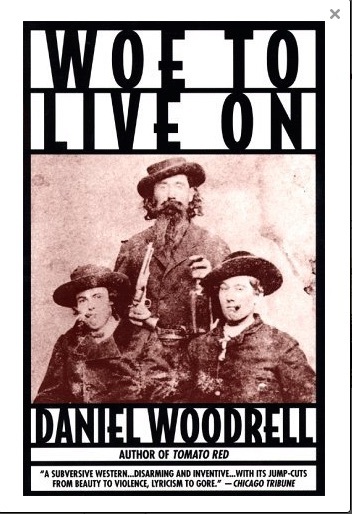
Hearing about my historical novel, The Lies That Bind, Anne Sanow, the visiting guest writer at the University of Missouri-St. Louis where I teach writing as an adjunct, recommended that I read Woe to Live on by Daniel Woodrell. That turned out to be one of the best suggestions I'd gotten in quite a while. I’m a big Woodrell fan now for sure.
You might know of Woodrell from his earlier novel, Winter’s Bone, which was made into a great film, shot entirely in Missouri with a cast including a number of amateurs. I thought the film was the best of the year at that time, and "Winter’s Bone" earned 19-year-old Jennifer Lawrence an Academy Award nomination. Quite an honor for a low-budget film, and Lawrence deserved it for her performance, which made her career. Great book, great film, too.
Anyway, Woe to Live on takes place on the Missouri-Kansas border during the Civil War, same time and place as the upcoming second book in my DarkHorse Trilogy, Honor Among Outcasts. I’ve already written about the border guerrilla war being the vilest, most dehumanizing part of the war—much like today’s Syrian civil car. In 1999, director Ang Lee made an excellent film based on Woe to Live on, called “Ride with the Devil,” starring Toby Maguire.
There's a nice twist on the point of view in Woe to Live on. Jake Roedel is the lead character, and he is entirely out of place as a 16-year-old, pro-secession guerrilla. He is lured by his best friend, Jack Bull Chiles, the son of old Southern gentry, to join Black Jack Ambrose’s mounted “Irregulars.” Jake Roedel is second-generation German, what the guerrillas called “Dutch” from the word “Deutsch.” The Germans in Missouri, fleeing persecution in Germany and seeking democracy in America, were very pro-Union and anti-slavery, and the rebel guerrillas hated and readily killed them, even innocent civilians. Lincoln received 10 percent of the votes in the four-way 1860 presidential race in Missouri, and most of those votes were German.
One reviewer describes the book as “brutal yet poignant, ironic and spiked with earthy, irreverent humor.” As the story advances, Jake learns a great deal: his side in the war, knowing defeat of the Confederacy is coming, turns to mostly murder and robbery.
I’m not going to give much away. Interestingly, though, the book begins ironically. Riding with the guerrillas, Jake shows he belongs by hanging an innocent German, a man like the very people he comes from, like his own father. Even worse, he murders the man’s young son when the boy tries to cut his father down, shooting the unarmed boy in the back. Nasty stuff in a nasty conflict.
Inspiring writing. I recommend Woe to Live for all history buffs.
Upcoming Events:
March 31: LA Talk Radio “The Writer's Block” - live interview and podcast
April 28: Reading/Signing at Subterranean Books in the Loop, St. Louis
June 23: Reading/Signing at Left Bank Books, Central West End, St. Louis
March 8, 2016
More Lively Discussions are Coming!
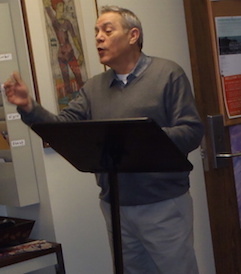
Last month, I did the first reading from my novel, The Lies That Bind, at the University of Missouri-St. Louis (see recent blog post, “Fun Reading Stimulates Insightful QA&A”). That appearance prompted an invitation from one of the English department's faculty to speak at her “Literature of the American Civil War” class later this month. Should be fun!
Most Americans know about this epochal event in American civilization, so I wasn’t surprised at the depth of the conversation that first reading prompted. (Incidentally, as a former amateur thespian, I’m enjoying the chance to read dramatically, especially since the story is quite dramatic itself.)
I am more than willing to do more readings or discussions. So contact me if your school or organization is interested.
OUT & ABOUT
· Thurs., March 31. Interview on LA Talk Radio’s “The Writer’s Block” show, 10 pm CT. Details.
· Thurs., April 28. Reading/signing at Subterranean Books in St. Louis, 6:30-7:30 pm. Details.
· Sun., Sept. 11. Reading/signing at Garden District Book Shop, New Orleans, 2-3:30 pm. Details.
· Sat., Oct. 29. On the panel at the St. Louis Central Library's 2016 Author Shout Out! event. Details.
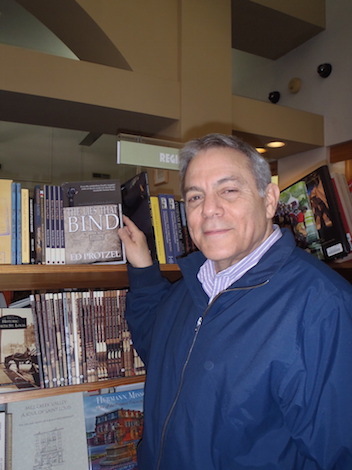
ON THE SHELVES
Left Bank Books, St. Louis
The Booksellers at Laurelwood, Memphis
University City Public Library (soon)
More to come...
Progressing on Book 2, Honor Among Outcasts
Because The Lies That Bind takes place 1859-61 Mississippi, it overlaps with the beginning of the Civil War. Honor Among Outcast, the second book in my DarkHorse Trilogy, takes place smack dab in 1863 Civil War Missouri, a guerrilla war not much kinder than the Syrian civil war today.
Oh, my poor characters, women and men, black and white! Leaving antebellum Mississippi for Civil War Missouri takes them out of the frying pan, and into the fires of hell. Like people today—and at every time—the novel’s characters also are in denial about the war. Of course, it has a profound effect on them in a number of ways. But America needed this conflagration for its transformation from a slave society.
In the meantime, I’m readying for the students’ questions on March 25.
(See amazing Amazon reviews!)
February 22, 2016
Fun Reading Stimulates Insightful Q&A
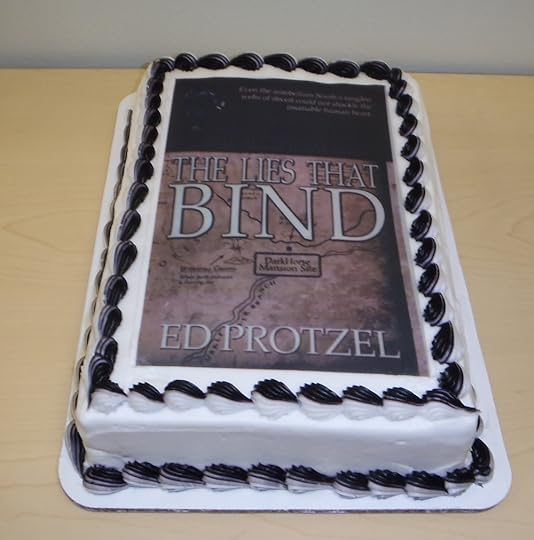




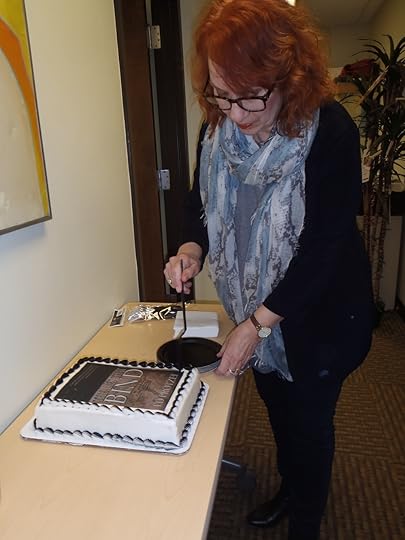

Click to begin slideshow
Lots of fun last week with a well-attended reading and book signing of my novel, The Lies That Bind, at the University of Missouri-St. Louis, where I teach adjunct. The Q&A discussion afterwards was lively and far-ranging, with many historical and other insights from the audience, few of whom had yet read the book. The myths surrounding slavery (which my novel attempts to debunk), gender in the antebellum South, the Civil War — so many great discussion threads were followed. I was even invited to speak to the English department's Civil War literature class. I loved every minute of it. The conversation could have gone on for hours.
The reading was sponsored by the gender studies department and coordinated by the English department. As a nod to gender studies, I began the reading with excerpts from Chapter 2, where we first encounter the reclusive Missus Marie Brussard French, and her strange son, Devereau. A volatile scene, indeed!
Special thanks to Lynn Staley of English, who initiated the reading and worked so hard to put everything together — even cake! Kudos, too, to the folks at the UMSL bookstore. The student “womaning” the sales got so involved in the discussion that she bought a copy of the book for herself!
An educator I spoke with recently thought The Lies That Bind should be taught in schools. Frankly, I always believed that myself. It would be an innovative way for twenty-first century students to get a sense of what it might have been like to live in a nineteenth-century slave society (or any society based on lies). The book also could serve to illustrate how no one can escape the tsunami of war, but rather how we are sometimes swept by folly into doomed blunders. Vietnam, Iraq II are very strong parallels.
Honor Among Outcasts Discussion
I also touched a bit on the second novel in the DarkHorse Trilogy, Honor Among Outcasts, which I am working on now. Most of the main characters from The Lies That Bind appear prominently in Honor, plus some minor characters rise to the top and become very important. I can’t wait to see readers’ reactions to the surprises, although the book can be read independently. For research, I’ve found Guerrillas in Civil War Missouri, by James W. Erwin, enlightening.
Again, thanks for all the kind words and interesting feedback.
Click BUY/CONTACTS page to order your copy of The Lies That Bind!
Next Reading: I can’t wait until my next scheduled reading on April 28 in St. Louis at Subterranean Books. Try to come if you're in St Louis.
Check the EVENTS page for all upcoming events.
Request a Visit: To request that Ed talk about The Lies That Bind at your organization, school, book club, or bookstore — in person, via phone or Skype — email [email protected].
February 8, 2016
Book Club Likes the Portrayal of the Female Characters in The Lies That Bind
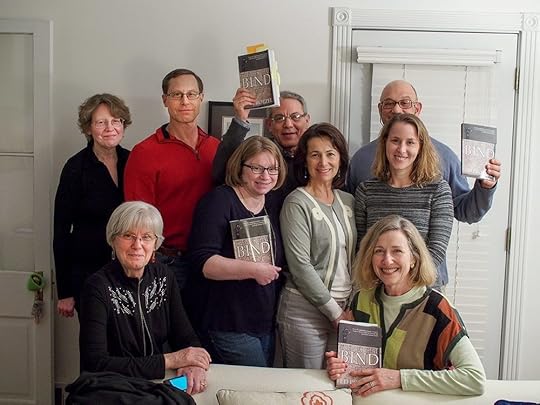
It was a great honor—and a helluva lot of fun!—to attend the February meeting of a neighborhood book club in University City (MO) last week for their discussion of my novel, The Lies That Bind—and many other fascinating topics, too. I was thrilled that the club’s members were so perceptive about the novel. What a great group!
Two Favorite Aspects
From my memory—which the good wine reduced somewhat—there were two things the members especially liked.
The first was highly gratifying: they appreciated how well the novel’s female characters were portrayed. Since the club was 75 percent women, that meant a lot to me. Indeed, the members complained that too many novels by men paint poor portraits of women. I do listen carefully to comments I get from readers when I’m working on a novel, and in this case, the feedback from my female readers helped immeasurably.
The members also stressed how much they enjoyed the story’s many twists and turns, surprises and revelations. The novel’s been out for just over a month now, and that’s a consistent theme I’m hearing.
Use of Chess
I've also noticed how people are enjoying the consequential chess game between all the characters—each using lies to hide dark secrets as they strive for survival. Readers also get a kick when they realize that the author himself (me) is playing a chess game of sorts with their expectations.
And finally, they appreciate that, when the games are over, there are significant themes that relate to society, any society, including today’s America.
I also touched on Honor Among Outcasts, the second book in the DarkHorse Trilogy, which I am working on now, giving only a short overview of the conflict. Since many of the characters from The Lies That Bind follow into Honor, I assumed the club members were curious to see where they were going—and what challenges they faced. Useful to know.
And, of course, I couldn't leave without talking a bit about my just-finished thriller, The Antiquities Dealer, and there is one major point that made them gasp—and that they liked. More on that in a future blog perhaps.
Thanks for all the interesting feedback. Keep it coming!
Find several reader reviews on Amazon.
February 1, 2016
Black History Month; Good Time to Research The Lies That Bind Sequel
Right now, I’m working on Honor Among Outcasts, Book 2 of my DarkHorse Trilogy and the sequel to Book 1, The Lies That Bind. I'm not just working on developing the story, but preparing the research, too. Black History Month couldn’t come at a better time to stimulate my thoughts and feelings, and to offer fresh insights into the Black Experience in America, which has been nothing short of epic on the world stage.
The new novel will take place in Missouri—gasp!—to where the DarkHorse partners have fled from Mississippi. Beginning in 1863, Durk, Big Josh, Isaac, and the other former slaves will finally get their chance to put on the Union uniform, to fight for the liberation of all Southern slaves.
But things are not as simple as they anticipate.
Of course, visionary charlatan Durk Hurst, continuing his role from The Lies That Bind as the “white front man” for the DarkHorse partnership, has worked alongside the others all along, sharing their joys and their hardships.
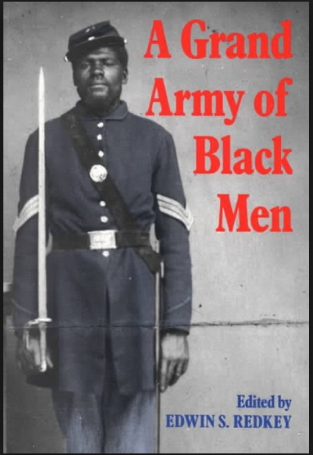
In the new book, Durk gets the group through these rough times by characterizing his partners as “contraband” laborers, supposedly “liberated” by himself. Sometimes he calls them his own “manumission-freed former slaves,” depending on what story he is spinning and to whom on any given day, to serve whatever ends Durk’s instincts dictate. Of course, sometimes Hurst’s golden tongue does get them out of trouble—and sometimes it gets them deeper into trouble. Oh, well. Durk may be part-Seminole, but he’s the only white face his partners have to depend on.
Brutal, War-Torn Missouri
Prior to 1863, when the story begins, General Samuel Curtis had defeated the Confederate army at Pea Ridge, and chased it to Arkansas. Was that the end of fighting in Missouri? No, the worst was just beginning. During the war, Missouri had more battles and clashes than any other state besides Virginia. But they weren’t set-piece battles.
After Pea Ridge, Missouri became neighbor against neighbor, terrible stuff. The state quickly devolved into hit-and-run guerrilla attacks: civilians were victims of atrocities, and generally, few prisoners from either side lived to tell the tale. Civil war is the nastiest kind, and guerrilla war the worst of all. Look at Syria today. Civil war, guerrillas, atrocities, refugees, devastation. Well, Missouri had all that—and more!
Bushwhacker Brutality
Missouri’s pro-slavery guerrillas, called “bushwhackers”—yes, you’ve heard that reviled term—raided Lawrence, Kansas, and killed hundreds of civilians before returning home. In desperation, the Union military authority issued Order No. 11, which emptied out more than three counties in western Missouri, where many guerrillas lived. I mean cleaned them out, including pro-Union civilians, everybody. Women with husbands at war and children to raise, widows, the elderly. Many destitute, without means to carry a few goods to sustain them, were forced onto the road. And it wasn’t done in a kindly way, as you might well guess. Union soldiers, like their bushwhacker counterparts, robbed and burned. That was Missouri.
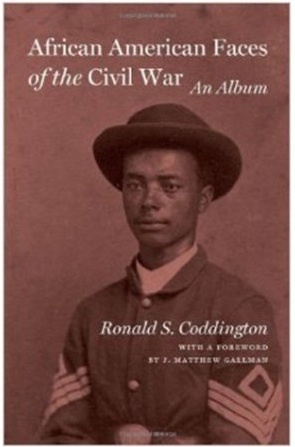
The African-American War Effort
Since twelve of the thirteen DarkHorse partners are black, naturally I’m busy researching and learning about that experience during the war. Two books I’m excited to have found are A Grand Army of Black Men, edited by Edwin S. Redkey (Cambridge University Press); and African American Faces of the Civil War: An Album, by Ronald S. Coddington (The Johns Hopkins University Press/Baltimore). See Library of Congress webcast discussion of the Coddington book.
I’m also very happy to be studying Guerrillas in Civil War Missouri, by James W. Erwin (The History Press); and A Rough Business: Fighting the Civil War in Missouri, edited by William Garrett Piston (The State Historical Society of Missouri).
Real history must never be forgotten, least we repeat our errors. And as I delve more deeply into our country’s history, the clearer it becomes that history itself is truly stranger than fiction.
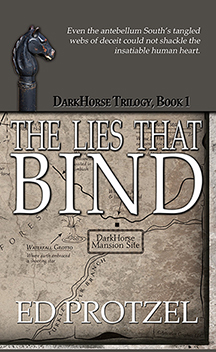
Enjoy reading The Lies That Bind, and I’ll keep working on Honor Among Outcasts.
Coming up:
Book Launch for The Lies That Bind, Feb. 18, University of Missouri-St. Louis
LA Talk Radio's “The Writer's Block”
Check out my online interviews:
Hangin With,” G.W. Pomichter’s video show (30 min.)
David Clarke’s “Different Strokes for Different Folks” (58 min.)
January 25, 2016
The Meaning of DarkHorse — and Democracy
“Democracy is the worst form of government, except for all the others.”
- Winston Churchill

Since I’ve been asked, and since The Lies That Bind is the first novel in my planned DarkHorse Trilogy, I’ll explain the two basic interpretations of the name, DarkHorse, the literal meaning and the mythological meaning.
The Protagonist
First is the name of the main character: Durksen Hurst. Durksen is Hurst’s given name, but he goes by Durk. Now, Durk was raised by the Chickasaws from the age of ten, but due to their limited familiarity with English and the similarity to the words Durk Hurst, the Chickasaws called him “Dark Horse,” a name that stuck.
The Plantation
Second is the name of the plantation, DarkHorse (an egalitarian partnership between a visionary charlatan and a group of slaves). Durk’s need to prove himself to the town of Turkle is expressed by naming the plantation after his Native name, DarkHorse. Why spell it as one word? Because that’s how he writes it on the deed. While Durk is a reader, he is self-educated, and his written skills are limited. In rural antebellum Mississippi, few were highly literate. In The Lies That Bind, only the Devereau French and Antoinette DuVallier characters are well-read in the classics.
The Real Significance
Then there is the real meaning behind the name DarkHorse. These thirteen men, near starvation and with little to lose, try to carve out their own farming enterprise from the surrounding Chickasaw swampforest (with Durk having swindled the rights to a patch of land from the local tribe). And wasn’t—or isn’t—that America (including robbing the Native Americans)? Didn’t our ancestors, and don’t immigrants today, find themselves on these shores looking to build new lives, and a new civilization, unbound by the strictures of the past — bound only by rules they conceive themselves, rules far different from those they left behind in the Old World? And it doesn’t matter whether they came across the ocean in steerage or first class, in the hull of slave ships, or by modern-day airplane, they all had common aspirations.
The Old World had a rigid class system: kings, aristocracies, all manner of tribal tyrannies. Except for Athens and a sprinkle of states, that’s the way the human race organized itself. In fact, that’s the way most of the world still is today. Even mercantile, parliamentary England had an aristocracy until the twentieth century. Unless you earned a title by pulling an arrow out of the king’s butt at the battle of Widdle-upon-Piddle five centuries ago, you had a rough road ahead.
And DarkHorse? A handshake between themselves and Durk was all the partners had to go on. Those men had to learn to trust and rely on each other. Their creation was a democracy of sorts, making up the rules as they went along, with everyone participating on his own terms, the decisions being made by consensus, through debate — or rather, under their tense circumstances, outright argument.
Of course, the society surrounding them was a slave society, about as rigid a structure as you can get. Run by the powerful French family, little Turkle, Mississippi, was slave vs. free, aristocrat vs. sodbuster. Impoverished whites clung to the belief they were better than slaves. House slaves believed they were better than field slaves. Field slaves believed they were better than house slaves. In the novel, former house servant Old Moses dismisses his partners with the term “field hands,” and he doesn’t mean that as a compliment; while his partners make fun of his house servant ways.
DarkHorse has no rigid structure. Its members are recognized by what they can accomplish, not by preconceived notions or birth status. Big Josh, with his deep knowledge running his former dissolute master’s plantation, with his wisdom, with his strength and his peacemaking skills, is actually the partnership’s unacknowledged leader.
Durk, the figurehead white man, is the front for DarkHorse out of necessity, and the townsfolk give him all the credit for its success. But Durk’s real talents are mostly fast-talking and, to a minor degree, building fires. And his fast-talking may sometimes prove more a drawback than a boon to the partnership, creating “fires” he hadn’t intended. (Such as when Durk signs manumission documents freeing his partners, whom he never owned, in essence invalidating those very papers!)
Naturally, the DarkHorse partners argue, even come to blows, trying to dig themselves out of their desperate situation and build some kind of security for themselves. But democracy is rough and tumble, and solutions come the hard way. To paraphrase Churchill, “Americans always do the right thing — as a last resort.” In spite of our repeated failures, through all kinds of hardships, we usually seem to find a way to do things a little bit better in the future. It may be trial and error at times, but at least we have mechanisms for change.
Meantime, in 1861, outside the partners’ insulated world, the country itself is coming to blows: the Civil War, a conflict necessary to break down the rigid structure of the slave system, in which 700,000 Americans would die. Democracy is not always pretty.
Try as they might to ignore what’s happening elsewhere, in the second book of the DarkHorse Trilogy, Honor Among Outcasts, the DarkHorse partners will find themselves engulfed in this not-so-fraternal American conflict. Woe to them.
Online Interviews:
Hangin With” G.W. Pomichter
David Clarke’s “Different Strokes for Different Folks”
Book Launch for The Lies That Bind, University of Missouri- St. Louis
January 18, 2016
Dr. Martin Luther King, Jr. and The Lies That Bind’s Big Josh
Voices Dr. King believed would have the final word—voices of unarmed truth and unconditional love.
- President Barak Obama's State of the Union Address, 2016

Today is the 30th anniversary of the Dr. Martin Luther King, Jr., federal holiday. When you visit Washington, D. C., be sure to visit the Dr. King memorial on the national mall. Yes, Dr. King’s visage in granite is moving. You immediately discover tears forming in your eyes, a lump in your throat, your pulse racing, and a heaviness in your heart. But what is more moving than any sculpture are his words carved in stone all around you, expressing the eternal ideas those words capture so concisely, so sublimely, so profoundly.
Also, when in Memphis, be sure to visit the the National Civil Rights Museum at the Lorraine Motel, where Dr. King was assassinated. When we last visited Memphis, the museum itself was in its early stages. Even then, when the project was merely the motel and the rudimentary foundations of the museum across the street, it was exceptionally moving. We hope to go back soon.
Dr. King’s Influence on Big Josh
When I wrote the screenplay The Lies That Bind is based on, Barak Obama was not yet a national figure. At that time, black men were not portrayed in film and fiction as leaders as they are now. I created the character Big Josh in my book as the leader figure, part of a new American mythology depicting a racially harmonious America where people are equally recognized for their virtues.
A slave, simple-looking, speaking with a stutter, people in the antebellum South would have looked right through Big Josh, not seeing the man himself. Yet in the egalitarian DarkHorse partnership, where Durk Hurst and twelve uprooted slaves agree by a simple handshake to carve their own plantation out of the wilderness, it is Big Josh who is their true leader. Hurst, the white man, is merely the front man to whom the town, naturally, gives all the credit for their accomplishment. But, in truth, it took all thirteen men to make DarkHorse a success. As Hurst acknowledges, Big Josh is the heart and brains of their plantation—without whom DarkHorse would surely fail.
In essence, as I see it, Big Josh is the literary, mythological precursor to Barak Obama, the leader of America as a whole.
Symbolically, these thirteen men are rootless, finding themselves stranded in the American wilderness (Mississippi/Chickasaw swamp), and from there they must learn to work together to achieve security and prosperity for all. Isn’t that the challenge America has always represented and that we’re faced with today? Hurst had no family, no friends, no place to call home. But Hurst’s slave partners, and America’s slave population in general, could never return to Africa thousands of miles away either. Talk about being stranded. Perhaps that is why Hurst, being an outsider himself, was able to see Big Josh as a man like other men, black and white.
In his past, Big Josh ran the plantation for his drunken master and, thus, has the skills and knowledge for DarkHorse to succeed. That was pure invention on my part. However, in my recent research, I found there were, indeed, slaves who ran plantations for dissolute masters [see: The Slave Community: Plantation Life in the Antebellum South by John W. Blassingame].
So there were men like Big Josh in real life!
A great soul, like Dr. King, in the worst of circumstances—a slave society—Big Josh is the peacemaker in the DarkHorse partnership, always keeping headstrong partners Durk Hurst and angry Isaac from coming to blows. The novel shows in very practical, down-to-Earth terms why Dr. King’s own inspiration claimed that peacemakers—men bearing only unarmed truth and unconditional love—are blessed. Big Josh exemplifies that spirit.
Celebrate Dr. King’s life today, sure. But keep in mind his eternal ideas every day. After all, I seem to remember that Dr. King told us that he had a dream, didn’t he? And while we’re closer to that dream than we once were, we haven’t achieved that dream just yet.
See DelawareBlack.com: "New historical novel, The Lies That Bind, debunks slave stereotypes"
Related blog posts:
Seeking a New American Mythology
Big Josh and Angry Isaac—Minus Stereotypes and the Chains of Slavery



